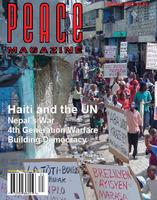
Peace Magazine Apr-Jun 2006, page 28. Some rights reserved.
Search for other articles by Theresa Wolfwood here
Diana Francis. London and New York: Pluto Press 2004
A Greek philosopher once said "How will you go about finding that thing the nature of which is totally unknown to you?"
That is the problem of thinking and writing about peace and probably why people write about war and anti-war, not peace. But this writer, Diana Francis is admirably qualified to write about peace. Her sole credential is that she is a lifelong peace activist. She does not seek credibility thorough professional status or titles. Now a grandmother, Francis dates her activism back to her teens. Then she was the child of parents who affirmed their pacifism by being conscientious objectors during the ever popular World War II. That she commits to the same beliefs speaks volumes about the peaceful and thoughtful upbringing she must have had.
She says that peace is a state in which the culture of people, the structures within which they live, the relationships between them and the attitudes and behaviours which they display are characterized by mutual respect. So trying to achieve peace by war...is liking trying to grow figs on a thistle. She says that much of the behaviour of global superpowers (now the USA only) is a defeat of justice, where the acceptance of war constricts and displaces constructive and cooperative forms of action, leaving those of us who want peace in the margins, cleaning up and picking up the pieces after destruction.
Francis believes that the peace movement itself is a place to learn and practise peace - a place where both personal transformation and community political action are essential. She says, "Building a mass constituency for the abolition of war will involve passionate and informed advocacy." And in no way does she believe war is inevitable or a permanent human way of solving conflict.
While we work we need to acknowledge both conviction and uncertainty while invoking in ourselves a moral responsibility for the belief systems and structures of our own society. I find Francis to be both wise and perceptive about peace building and at the end of the book she gives pages of excellent suggestions for action - from building solidarity networks and links between peace and economic justice and the environment, to exposing and ending the arms trade, to working in politic parties to change their policies to being a source of alternative, peaceful media.
She ends on a message of hope. Like Rebecca Solnit in Hope in the Dark, she sees many hopeful signs and directions -- from the successes of social and political actions in Latin America to the way in which people around the world are transforming their own realities as they challenge and often defeat globalization forces, both corporate and government.
In 2002 Francis wrote People, Peace and Power (Pluto Press) and I look forward to reading that next.
Reviewed by Theresa Wolfwood, a peace activist who lives in Victoria, B.C.

Peace Magazine Apr-Jun 2006, page 28. Some rights reserved.
Search for other articles by Theresa Wolfwood here